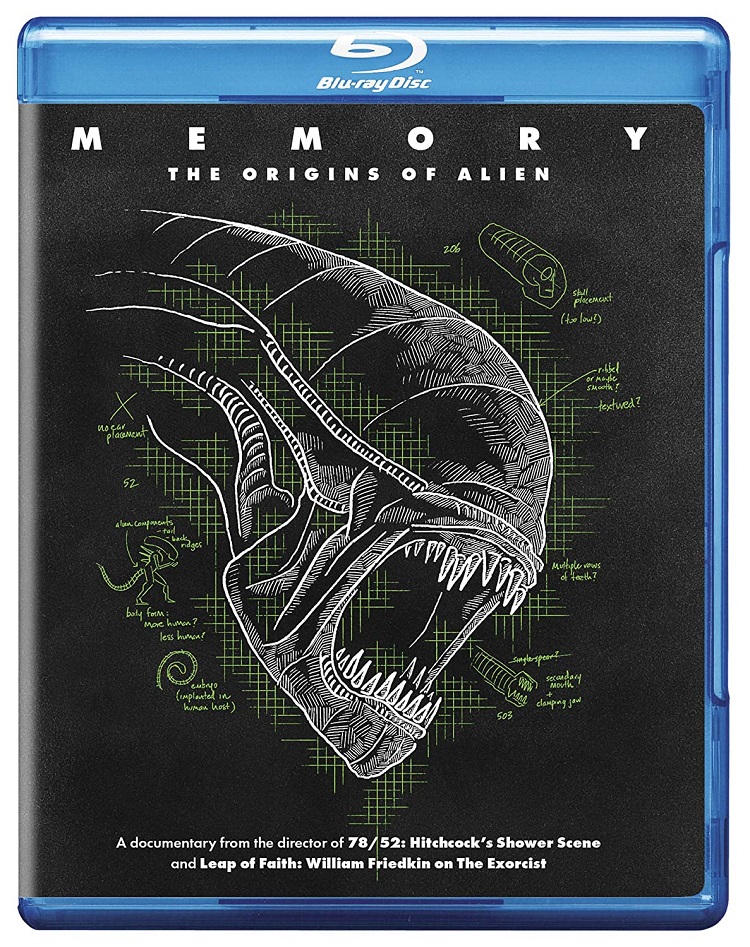
I’ve seen many making-of and behind-the-scenes featurettes for movies before, especially ones with elaborate special effects. I’ve seen documentaries about the visionaries behind creature design. What’s rare is a film that has such a breadth and wealth of inspiration that merely looking at everything it drew from and had injected into it to become an iconic, genre-defining powerhouse warrants an hour and a half discussion with experts just to get a handle on all of it. Insert Memory: The Origins of Alien, directed and written by Alexandre O. Philippe, which dives deep into all of the decades of influence that spawned the original Alien and ultimately launched one of the most lasting franchises in all of science fiction.
The film features previously unreleased material from creators Dan O’Bannon and H.R. Giger, including storyboards, designs, and notes. What became the first half hour of Alien was scratched together by O’Bannon in 1971 and titled Memory, but rather than picking up a vicious lifeform after landing to investigate a distress signal, the space travelers instead lost all of their memories due to a mysterious force on the planet. Interesting idea, but after those couple dozen pages, he wasn’t sure where to go. Several years later came the idea for Space Beast which reached a few eyes in Hollywood, but didn’t get a ton of traction. Some fortuitous interactions and conversations later, O’Bannon had acquired a director, a creature designer, some financing, and had managed to gradually adapt Memory into the Alien we know and love today.
Beyond Giger putting his nightmares on canvas and O’Bannon sculpting a creature feature with actual legs, this documentary also examines the films that share similarities with Alien, as well as what made them different or less successful. Part of that was due to Roger Christian’s set decoration that gave a grimy and industrial look to the space freighter Nostromo rather than the stereotypically sterile aesthetic science fiction had become known for. In addition, the many contributors — including Diane O’Bannon, Tom Skerritt, Ben Mankiewicz, Ronald Shusett, Carmen Giger, Roger Corman, Roger Christian, and Veronica Cartwright — discuss throughout the documentary influences from Greek mythology, political and class themes of the era in which it was produced, the perils of imperialism, gender norms (Ripley was originally written as a man), and how the film addresses the notion of male rape, pregnancy, and repressed feminine retribution against a patriarchical society. Before that, we had movies about giant ants or lizards, seldom with anywhere near that kind of depth.
Comparisons and evaluations are done between O’Bannon’s anamorphic shots for Alien and other contemporary films and television shows, leading to a dissection of sorts of how the iconic Chestburster scene was assembled. The stench of the authentic gore materials made it difficult to shoot the scene, and many of the reactions are genuine because the surrounding cast weren’t given a clear idea of what was about to happen, especially when the effect execution sometimes went awry. So that surprise and confusion you see in the finished film isn’t just good acting — that’s authentic emotion.
Alien left many theatergoers who were used to Close Encounters of the Third Kind and Star Wars shaken and uncomfortable, perhaps so much so that viewers retreated toward friendlier extraterrestrials for much of the next decade like E.T., Cocoon, Starman, Mac and Me, and Flight of the Navigator. It made a profound impact that I think affected and helped diverge science fiction going forward into those two camps — safe versus lurid. Memory: The Origins of Alien peels back that narrative and shows us that these themes were here and we embraced them all along whether we knew it or not, and put an unnerving bow on top of that package to drive the point home. It was enlightening seeing just how many layers and messages Alien has, even more than I realized despite having been a fan for decades.